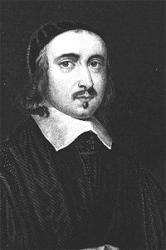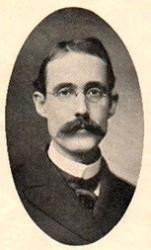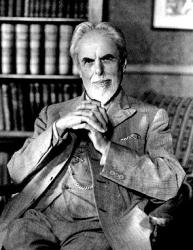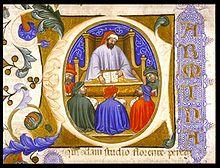Planning worship?
Check out our sister site, ZeteoSearch.org,
for 20+ additional resources related to your search.
- |
User Links
Person Results
Jeremy Taylor

1613 - 1667 Author of "Descend to thy Jerusalem, O Lord!" in Services for Congregational Worship. The New Hymn and Tune Book Taylor, Jeremy, D.D. This poet of preachers was born of very humble parentage on both sides, at Cambridge, in August, 1613. His father was a barber. He must have had a good school as a boy. He entered Cams College, of his native city, as a "sizar" in 1626. His career at the university was a brilliant one. He was made fellow of All Souls College, Oxford, in 1632; and rector of Uppingham, Rutlandshire, in 1638, as is still proudly remembered there. He was inevitably "sequestered" by Parliament in 1642. Inexorable necessities of circumstance put him in prison. During the opening of the great Protectorate he kept a school in Wales along with William Nicholson, and acted as chaplain to the Earl of Carberry at Golden Grove, Carmarthenshire, one of the pilgrim spots of our country, because of this and of his imperishable book named after it. In 1658 he is found in Ireland. He preached at Lisburn and Portmore. He returned to London early in 1660, and signed the loyalist or royalist Declaration of the Nobility and Gentry, on April 24th, thirty-five days before the "Restoration." He was not overlooked, as so many faithful royalists were. He was consecrated bishop of Down and Connor in January, 1661; made a member of the Irish Privy Council in February; entrusted with the diocese of Dromore in March: and in the same year was chosen Vice-chancellor of the University of Dublin. He died at Lisburn, August 13th, 1667, and was interred in the choir of the cathedral of Dromore.
Bishop Taylor's complete works have been repeatedly edited, e.g. by Henry Rogers, Pitman, Bishop Heber, Eden; and manifold Selections and single books, as his Holy Living and Holy Dying. Notwithstanding his rich and im¬perial intellect, and enthralling eloquence, and absolute command of words, Bishop Taylor holds only a very small place in the Antiphon of England. It has been admirably said by Dr. Rowland Williams, "Poetry differs from eloquence, as love differs from friendship" (Stray Thoughts, 1878). His attempts at verse are eloquence, not poetry, and even the eloquence hampered and shallowed. The present writer collected his entire poems and verse-translations in the Miscellanies of the Fuller Worthies' Library (1870). In the "Introduction" the reader will find a critical ac¬count of the various hymns; and also therein an account is furnished of a flagrant misap¬propriation of Bishop Taylor's Hymns by Samuel Speed in his Prison Piety, or Meditations divine and moral. Digested into poetical heads on mixt and various subjects (1677). The following is the original title page of the volume in which all the Festival Hymns, save one, first appeared:—>
The Golden Grove, or a Manuall of Daily Prayers and Letanies Fitted to the dayes of the Week. Containing a short Summary of what is to be Believed, Practised, Denied. Also Festival Hymns According to the manner of "The Ancient Church." Composed for the Use of the Devout, especially of Younger Persons; By the Author of "The Great Exemplar." London: Printed by J. F. for R. Rayston, at the Angel in Ivie Lane, 1655. (12 mo.) A 2nd edition appeared in 1657 with the Author's name thusBy Jer. Taylor, D.D., Chaplain in Ordinary to his late Majesty—a courageous announcement in the circumstances. A 3rd edition seems to have disappeared. The 4th ed. appeared in 1659; and from it is derived the second Christmas Hymn, “Awake, my soul," which was not in either the 1st or 2nd ed. Heber, Pitman, and Eden overlooked this hymn. [Rev. A. B. Grosart, D.D., LL.D.]
From Bishop Taylor's Golden Grove, 1655, the following hymns are in common use:--
1. Full of mercy, full of love. Prayer for Charity. From the Golden Grove, p. 116, where it is given in 20 lines, and headed, "A Prayer for Charity." It was given in Bishop Heber's posthumousHymns, &c, 1827, p. 109, and thus came into later hymnbooks.
2. Lord, come away, why dost Thou stay. Advent.
3. Lord, let Thy flames of holy charity. Whitsunday. This begins with line 12 of his hymn in the Golden Grove, "On the Feast of Pentecost, or Whitsunday," p. 157.
His Christmas Carol, "Where is this blessed Babe” and his Prayer, "My soul doth pant towards Thee," are also from the Golden Grove.
-- John Julian, Dictionary of Hymnology (1907)
Jeremy Taylor
John L. Bell
b. 1949 Person Name: John L. Bell (b. 1949) Author of "Psalm 124" in Church Hymnary (4th ed.) John Bell (b. 1949) was born in the Scottish town of Kilmarnock in Ayrshire, intending to be a music teacher when he felt the call to the ministry. But in frustration with his classes, he did volunteer work in a deprived neighborhood in London for a time and also served for two years as an associate pastor at the English Reformed Church in Amsterdam. After graduating he worked for five years as a youth pastor for the Church of Scotland, serving a large region that included about 500 churches. He then took a similar position with the Iona Community, and with his colleague Graham Maule, began to broaden the youth ministry to focus on renewal of the church’s worship. His approach soon turned to composing songs within the identifiable traditions of hymnody that began to address concerns missing from the current Scottish hymnal:
"I discovered that seldom did our hymns represent the plight of poor people to God. There was nothing that dealt with unemployment, nothing that dealt with living in a multicultural society and feeling disenfranchised. There was nothing about child abuse…,that reflected concern for the developing world, nothing that helped see ourselves as brothers and sisters to those who are suffering from poverty or persecution." [from an interview in Reformed Worship (March 1993)]
That concern not only led to writing many songs, but increasingly to introducing them internationally in many conferences, while also gathering songs from around the world. He was convener for the fourth edition of the Church of Scotland’s Church Hymnary (2005), a very different collection from the previous 1973 edition. His books, The Singing Thing and The Singing Thing Too, as well as the many collections of songs and worship resources produced by John Bell—some together with other members of the Iona Community’s “Wild Goose Resource Group,” —are available in North America from GIA Publications.
Emily Brink
John L. Bell
Marion Franklin Ham

1867 - 1956 Author of "O Lord of life" in The Beacon Song and Service book Born: February 18, 1867, Harveysburg, Ohio.
Died: July 23, 1956, Arlington, Massachusetts.
Buried: Mount Auburn Cemetery, Cambridge, Massachusetts.
Ham began his career as a journalist and bank clerk in Chattanooga, Tennessee. Ordained a Unitarian minister in 1898, he pastored in Chattanooga (1898-1904); at the First Church in Dallas, Texas (1904-09); and in Reading (1909-34), Waverly (1934-42), and Gardner, Massachusetts (1943-45). The Meadville Theological School in Chicago, Illinois, awarded him a Doctor of Divinity degree in 1942, the year he retired. Ham’s works include:
The Golden Shuttle, 1896
The Kinchin Stories, 1914
Songs of the Spirit, 1932
Songs of Faith and Hope, 1940
O Mother-Heart, 1941
Keeper of the Flame, 1945
Freedom, 1950
Songs at Sunset, 1951
Songs of a Lifetime, 1953
In a Rose Garden, 1954
www.hymntime.com/tch/
Marion Franklin Ham
Charles Willis
Person Name: Charles L. Willis Arranger of "OLD 124TH" in Psalms, Hymns, and Spiritual Songs
Charles Willis
Thomas H. Cain
1931 - 2003 Person Name: Thomas H. Cain, b. 1931 Author of "Eternal Lord of love, behold your Church" in The Hymnal 1982
Thomas H. Cain
Laurence Housman

1865 - 1959 Author of "Father Eternal, Ruler of Creation" in The Mennonite Hymnary, published by the Board of Publication of the General Conference of the Mennonite Church of North America Housman, Lawrence, author and artist, was born July 18, 1867, at Bromsgrove, Worcs. His devotional poetry is principally in his Spikenard, 1898, and Bethlehem, 1902. To the English Hymnal, 1906, he contributed eight translations (142, 188, 191, 228, 229, 230, 231, 234); also three original hymns, with a fourth previously published, viz.:—
1. Lord God of Hosts, within Whose hand. St. George.
2. The Maker of the sun and moon. Christmas. From Bethlehem, 1902, p. 75.
3. The Saint who first found grace to pen. St. Mark.
4. When Christ was born in Bethlehem. Holy Innocents. [Rev. James Mearns, M.A.]
--John Julian, Dictionary of Hymnology, New Supplement (1907)
==================
Born: July 18, 1865, Bromsgrove, Hereford, England.
Died: February 20, 1959, Glastonbury, Somerset, England.
Buried: St. Mary’s, Bathwick, Smallcombe, near Bath.
Housman studied art at the Lambeth School of Art and the Royal College of Art. He had great success as an illustrator, but when his eyesight began to fail, he turned to writing books and plays. He wrote 80 books during his lifetime. He often seemed to fall afoul of the censors, though, for religious and political reasons. A committed socialist and pacifist, in 1907, he helped found the Men’s League for Women’s Suffrage. He was also an honorary associate of the Women Writers’ Suffrage League. His works include:
Jump-to-Glory Jane, by Meredith
Goblin Market, by Christiantina Rossetti, 1893
The End of Elfintown, by Jane Barlow, 1894
Spikenard, 1898
The Sensitive Plant, 1898
Bethlehem, 1902
The Blue Moon, 1904
Angels and Ministers, 1921
Little Plays of St. Francis, 1922
Victoria Regina, 1937
The Unexpected Years, 1937 (autobiography)
--www.hymntime.com/tch
Laurence Housman
Boethius

480 - 524 Person Name: A. M. S. Boethius Author of "O Thou whose pow'r o'er moving worlds presides" in Hymns of the Spirit for Use in the Free Churches of America Anicius Manlius Severinus Boëthius, commonly called Boethius(English: /boʊˈiːθiəs/; also Boetius /boʊˈiːʃəs/; c. 480–524 AD), was a Roman senator, consul, magister officiorum, and philosopher of the early 6th century.
See more in:
Wikipedia
Boethius
William Whittingham
1524 - 1579 Person Name: W. W. Author of "Nisi quia Dom" in The Whole Booke of Psalmes
William Whittingham


 My Starred Hymns
My Starred Hymns

